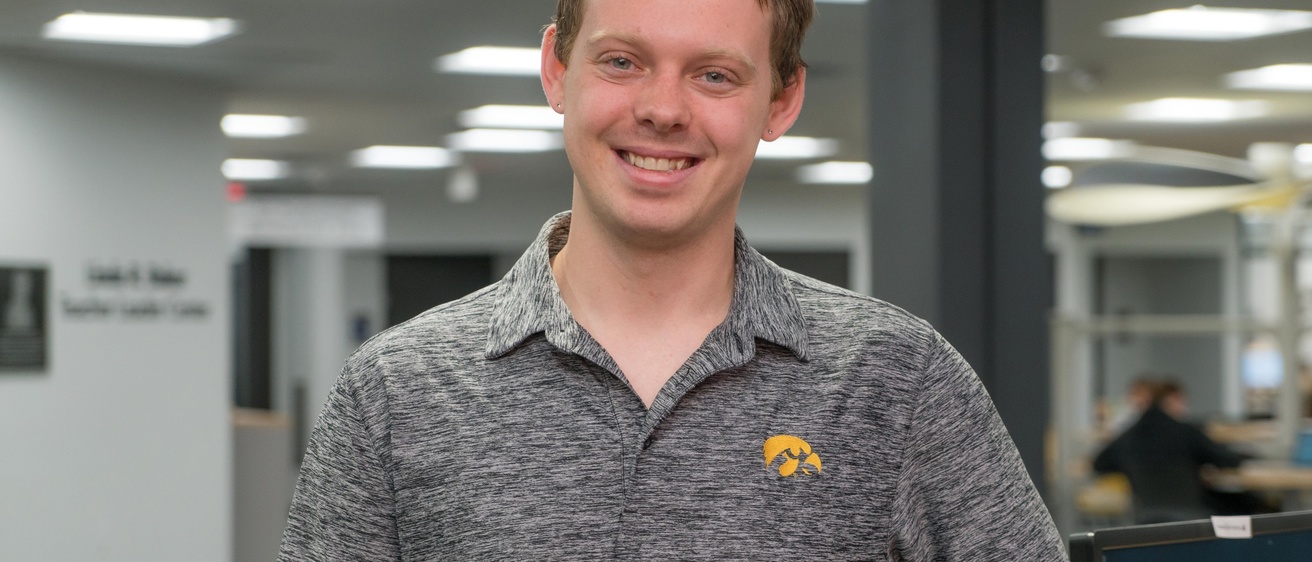By Lois J. Gray
Treye Rosenberger knows first-hand what if feels like to be marginalized because of his identity.
Rosenberger, a graduate student in the University of Iowa College of Education's Rehabilitation and Mental Health Counseling program, says he first identified as a homosexual man while attending high school in Tipton, Iowa.
Though he faced some negative feedback, Rosenberger became more confident and comfortable with his identity over time.
Rosenberger, who plans to become a professor, researcher and clinician in Counselor Education and Supervisor, was recently recognized with the Dr. Ted Daniels Scholarship.
The National Council on Rehabilitation Education and Council on Diversity and Equity made the announcement this fall that Rosenberger was the recipient of the 4th Annual Dr. Ted Daniels Scholarship Award from the National Council on Rehabilitation Education.
Rosenberger received the award at the Fall 2017 Conference in Washington, D.C. from the late Daniels’ wife, Rita, during the awards luncheon on Oct. 27th.
The scholarship award honors master’s level students. Inspired by the consistent theme of diversity and inclusion throughout Daniels’ career and his unwavering commitment to his students, the Council on Diversity and Equity established the Dr. Ted Daniels Scholarship Fund to support the development of graduate or undergraduate students who demonstrate commitment to the advancement of diversity, academic excellence, leadership, and community service in the field of rehabilitation. The scholarship award is $1,000.
“Receiving this award for me meant that what I have to say about the importance of diversity and inclusion is being heard,” says Rosenberger. “It means that I have said something that people want to hear more about. When people are intrigued at what you have to say, they are more apt to listen and comprehend the material.”
Rosenberger says receiving the award was both humbling and inspiring. It also deepens his commitment to train future counselors who will be respectful of all types of diversity.
“The goal of teaching diversity and cultural competency should not be acceptance,” Rosenberger shared with the audience when accepting the award. “The world is comprised of many people and many beliefs, and the reality is we are not going to agree with everything, nor should we have to. But if we shift our focus to achieve the goal of respecting all people regardless, then that is when we truly learn and grow as a society.”
Rosenberger’s future career goals include becoming a professor, researcher and clinician in Counselor Education and Supervisor. His current research includes investigation into quality of life disparities, societal barriers and identity development in marginalized minority groups, with emphasis on members of the LBGT community.
“I plan to conduct research that will allow us as a society to better understand the lives of marginalized groups,” Rosenberger says. “I also want to create culturally-competent counselors and adequately prepare them to work in culturally diverse environments and with diverse individuals.”
Jennifer Sanchez, program director and assistant professor in the top-ranked Department of Rehabilitation and Counselor Education, nominated Rosenberger for the prestigious national scholarship.
“Treye entered our program with a bachelor’s degree in psychology,” Sanchez writes. “He was highly recommended by his former professors and supervisors. Even at the bachelor’s level, Treye exhibited the characteristics of both a leader and a team player. Treye was able to bring his own personal experiences on topics of diversity, while maintaining his professionalism.”
Sanchez says that Rosenberger continues to demonstrate these qualities as a graduate student.
“While attending school full-time, working part-time as a research assistant in our LGBT clinic, and working part-time in retail, Treye also holds various service and leadership positions in student organizations relating to disability, rehabilitation and counseling,” Sanchez wrote in Rosenberg’s nomination.
This includes working at the Johnson County Crisis Center, an opportunity that Rosenberger finds very rewarding.
Having ample opportunities to try new things, such as working at the crisis center, is what makes this program especially valuable, he adds.
“If I want to try my hand at research, there is something for me. If I want to present at a conference, I am supported and encouraged to do so,” Rosenberger says. “The drive from the faculty to make me better is what I most enjoy, and getting this experience every day will make me a better professional in the future. The most valuable thing about my education here is how I have grown as a person and how my growth effects what I will do in the future.”
